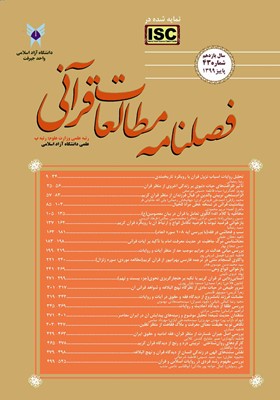تأثیر ظرافتهای حیات دنیوی بر زندگی اخروی از منظر قرآن
محورهای موضوعی : فصلنامه مطالعات قرآنی
بهروز آهنگری
1
,
سیده فاطمه حسینی میرصفی
2
![]()
1 - دانشکده علوم انسانی، واحد یادگار امام(ره)، شهر ری، دانشگاه آزاد اسلامی، تهران، ایران
2 - دانشکده علوم انسانی، واحد یادگار امام(ره)، شهر ری، دانشگاه آزاد اسلامی، تهران، ایران
کلید واژه:
چکیده مقاله :
این پژوهش با هدف بیان تأثیر ظرافتهای حیات دنیوی بر زندگی اخروی انسان بر اساس تحلیل مبانی و استناد به آیات قرآن کریم انجام شده است. نوع تحقیق مقاله حاضر، بنیادی- کاربردی و روش مورد استفاده تحلیلی- توصیفی است که با استفاده از منابع کتابخانهای(واقعی و مجازی) اطلاعات جمع آوری شده و ابزار گردآوری اطلاعات نیز به صورت فیش برداری میباشد. یافتههای این تحقیق نشان میدهد که روش و منش حیات دنیوی انسان، تأثیر مستقیم بر سعادت و شقاوت زندگی اخروی او دارد؛ و بیان میدارد انسانها در حیات پس مرگ، بدون استثنا بر سر سفره اعمال و کردار دنیوی خود مینشینند و روزی میخورند. بنابراین کسانی که عاقلانه و از روی آگاهی راه حق پیموده و در دنیا زندگی مؤمنانه در سایه احکام قرآن کریم داشتهاند بدون تردید زندگی اخروی آنان سرشار از رحمت و نعمات الهی است، و به عکس، کسانی که آگاهانه و به اختیار خود زندگی ظالمانه تحت امر شیاطین انس و جن داشتهاند، زندگی اخروی آنان نیز با رنج و سختی بلا وصف همراه خواهد بود، مگر کسانی که در شرایطی خاص به اذن الهی مورد شفاعت شافعین قرار بگیرند.
This research has been conducted with the aim of expressing the effect of delicacies of worldly life on the afterlife of man based on the analysis of principles and citation of verses of the Holy Quran. The type of research of the present article is basic-applied and the method used is analytical-descriptive, which the information is collected using library resources (real and virtual) and the data collection tool is also in the form of taking notes. The findings of this study show that the method and character of man's worldly life has a direct effect on the happiness and misery of his afterlife; And it states that in the afterlife, human beings, without exception, sit at the table of their worldly deeds. Therefore, those who have walked the path of truth wisely and consciously and have lived a faithful life in this world in the shadow of the rules of Holy Qur'an, their hereafter life is undoubtedly full of divine mercy and blessings, and vice versa, those who consciously and voluntarily live a cruel life under the effect of devils, their hereafter life will be accompanied by indescribable suffering and hardship, except those who are interceded by the intercessors in certain circumstances with the permission of God.
قرآن کریم.
ابن شهرآشوب مازندرانی، محمد بن علی. 1379ق، مناقب آل أبی طالب علیهم السلام(لابن شهرآشوب)، چاپ اول، قم: المکتبة الحیدریة.
تمیمی آمدی، عبد الواحد بن محمد. 1410ق، غرر الحکم ودرر الکلم، چاپ اول، قم: دار الکتاب الاسلامی.
راد، علی. بی تا، انسان در تراز قرآن، چاپ اول، قم: مؤسسه علمی فرهنگی دار الحدیث، سازمان چاپ و نشر.
طباطبایی، محمدحسین. 1374ش، ترجمه تفسیر المیزان، چاپ پنجم، ج 8، قم: جامعه مدرسین حوزه علمیه قم، دفتر انتشارات اسلامی.
طبرسی، فضل بن حسن. 1372ش، مجمع البیان فی تفسیر القرآن، چاپ سوم، تهران: ناصرخسرو.
عباسنژاد، محسن. 1384ش، قرآن، روانشناسی و علوم تربیتی، مشهد: بنیاد پژوهشهای قرآنی حوزه و دانشگاه.
عسکری، مرتضی. 1386ش، عقاید اسلام در قرآن، چاپ اول، تهران: مرکز فرهنگی انتشاراتی منیر.
فضل الله، محمد حسین. 1399ق، من وحی القرآن، چاپ هجدهم، بیروت: دار الملاک.
قطب، سید. 1425ق، فی ظلال القرآن، چاپ سی و پنجم، بیروت: دار الشروق.
کلینی، محمد بن یعقوب. 1407ق، الکافی، تهران: دار الکتب الإسلامیه.
مدرسی، محمدتقی. 1419ق، من هدی القرآن(تفسیر هدایت)، تهران: دار محبی الحسین.
مکارم شیرازی، ناصر. 1371ش، تفسیر نمونه، 28جلد، چاپ اول، تهران: دار الکتب الإسلامیه.
منسوب به امام جعفر صادق(ع). 1400ق، مصباح الشریعة ومفتاح الحقیقة، چاپ اول، بیروت: اعلمی.
هاشمی رفسنجانی، اکبر. 1383ش، فرهنگ قرآن، چاپ دوم، قم: بوستان کتاب.
_||_
The Holy Quran.
Ibn Shahr Ashob Mazandarani, Mohammad Ibn Ali. 1379 AH, Manaqib Al-Abi Talib (peace be upon him) (Laban Shahr Ashob), first edition, Qom: Al-Muktaba Al-Haydariya.
Tamimi Amadi, Abdul Wahid bin Muhammad. 1410 AH, Gharr al-Hakam and Darr al-Kalam, first edition, Qom: Dar al-Kitab al-Islami.
Rad, Ali. Bi Ta, Man at the level of the Quran, first edition, Qom: Dar Al-Hadith Scientific and Cultural Institute, Publishing Organization.
Tabatabai, Mohammad Hussein 1995, Translation of Tafsir al-Mizan, fifth edition, vol. 8, Qom: Qom Seminary Teachers Association, Islamic Publications Office.
Tabarsi, Fadl Ibn Hassan 1993, Collection of Statements in the Interpretation of the Qur'an, Third Edition, Tehran: Naser Khosrow.
Abbas Nejad, Mohsen 2005, Quran, Psychology and Educational Sciences, Mashhad: Quranic Research Foundation and University.
Askari, Morteza 2007, Islamic Beliefs in the Quran, First Edition, Tehran: Monir Publishing Cultural Center.
Fazlullah, Muhammad Hussein, 2020, from the revelation of the Qur'an, 18th edition, Beirut: Dar al-Malek.
Qutb, Seyed. 1425 AH, in the shadow of Qur'an, thirty-fifth edition, Beirut: Dar al-Shorouq.
Kelini, Muhammad ibn Ya`qub. 1407 AH, Al-Kafi, Tehran: Dar Al-Kotob Al-Islami
Modarressi, Mohammad Taqi 1419 AH, Men Hoda Al-Quran (Tafsir Hedayat), Tehran: Dar Mohebbi Al-Hussein.
Makarem Shirazi, Nasser 1992, Sample Interpretation, 28 volumes, first edition, Tehran: Dar Al-Kotob Al-Islami.
Attributed to Imam Ja'far Sadegh (AS). 1400 AH, Mesbah Al-Shariyat Vameftah Al-Haghighat, First Edition, Beirut: Alami
Hashemi Rafsanjani, Akbar. 2004, Quran Culture, Second Edition, Qom: Bustan Ketab


